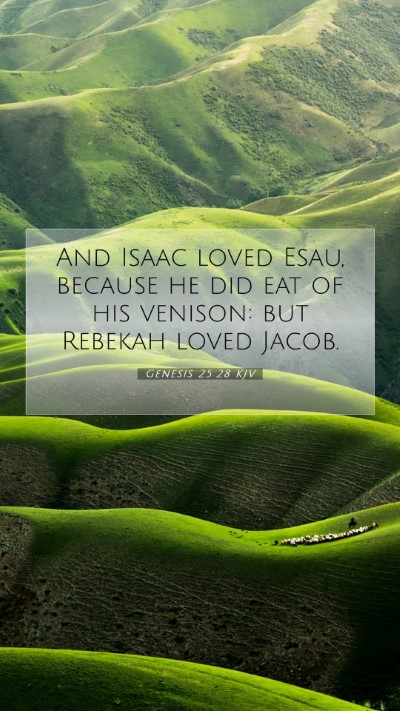Understanding Genesis 25:28 - A Comprehensive Bible Verse Commentary
Bible Verse: Genesis 25:28 - "And Isaac loved Esau, because he did eat of his venison: but Rebekah loved Jacob."
Introduction to Genesis 25:28
In Genesis 25:28, we find a profound statement regarding the familial dynamics and preferences that existed within the household of Isaac and Rebekah. This verse not only illustrates the complex relationship between the twins, Esau and Jacob, but it also serves as a critical juncture in the unfolding drama of the patriarchal narratives. By examining this verse, we can unlock deeper Bible verse meanings and biblical insights that have implications for understanding human relationships and divine purposes.
Key Themes and Insights
-
The Nature of Parental Favoritism
Matthew Henry notes that Isaac’s love for Esau was rooted in the hunter's skill and the physical sustenance he provided through his game. This favoritism sets the stage for conflict, illustrating the dangers of partiality in parenting. Such favoritism can breed resentment, division, and strife within families.
-
The Role of Rebekah
Albert Barnes emphasizes Rebekah's love for Jacob, indicating her understanding of God’s promise to Jacob—the younger twin. This highlights the tensions that arise when divine prophecy meets human favoritism: a theme prominent throughout the biblical narrative.
-
Foreshadowing of Future Events
Adam Clarke points out that this verse foreshadows the later events of Jacob receiving the blessing meant for Esau. This early preference sets the stage for the fulfillment of God’s promises and the conflicts that arise from human choices.
Biblical Exegesis of Genesis 25:28
The passage serves as a lens through which we can examine broader themes in Scripture, including:
- Divine Sovereignty vs. Human Agency: While God has a plan for Jacob, the actions of Isaac and Rebekah demonstrate the complicated interplay between divine foreknowledge and human decision-making.
- Sibling Rivalry: The tension between Esau and Jacob is emblematic of deeper familial conflicts that resonate throughout Scripture, reminding us of the need to seek reconciliation and unity.
- The Importance of Choice: The decision of Isaac and Rebekah not only affects their immediate family but has profound implications for the lineage of Israel.
Theological Reflections
From a theological perspective, Genesis 25:28 invites us to reflect on God’s plan amidst human shortcomings. In the patriarchal narratives, we see that despite weaknesses and injustices, God’s purposes ultimately prevail. This verse serves as a reminder that God's grace is often apparent in unexpected circumstances.
Application of Genesis 25:28
When applying this verse to our lives, several considerations emerge:
- Awareness of Favoritism: We should strive to treat all individuals equitably, recognizing the potential damage that favoritism can cause in relationships.
- Promoting Unity: In families and communities, we are called to work towards harmony, understanding that tensions can arise from perceived favoritism.
- Trust in God’s Plan: Believers can take comfort in knowing that, despite human failings, God’s overarching plan is still at work. This encourages us to live faithfully and with integrity.
Related Biblical Cross References
For a deeper understanding of the themes in Genesis 25:28, consider exploring the following verses:
- Genesis 27:1-45 - The story of Isaac blessing Jacob instead of Esau
- Hebrews 12:16-17 - A reflection on Esau's character and his loss
- Malachi 1:2-3 - God's love for Jacob and hatred for Esau as a national distinction
Conclusion
Genesis 25:28 provides a rich tapestry of familial, ethical, and theological themes that engage us in serious reflection about the implications of our choices and the nature of divine providence. As we study this scripture within Bible study groups or personal study, let us seek both the historical context and its application to modern life, allowing it to inform our understanding of Scripture and the meaning of Bible verses.
In this way, we can develop not only a deeper knowledge of scripture but also a more profound appreciation for the overarching narrative of grace that binds the biblical text together.


